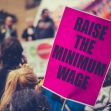Long Beach, California, passed an ordinance in January for “hero pay” which would require people who work in pharmacies and retail stores with 300 or more employees to receive a $4 per hour increase in pay for having to face more hazards during the COVID-19 pandemic. Los Angeles passed a similar ordinance in March with a $5 increase in pay. The Long Beach ordinance would require this “hero pay” to be added to employees’ usual pay for 120 days. After this measure was approved in Long Beach, the grocery store chain Kroger closed down two California locations. Kroger has been closing down locations where “hero pay” ordinances are in place. Kroger claims that they are shutting down these stores because they “underperforming” and that employees had the option to work in other locations. According to ZipRecruiter, Los Angeles grocery workers make an average of $17.51 per hour. “Hero pay” would raise the average to $22.51 per hour, excluding overtime and any other benefits that an employee may receive.
“The provision of premium pay better ensures the retention of these essential workers who are on the frontlines of this pandemic providing essential services and who are needed throughout the duration of the COVID-19 emergency,” according to the city’s ordinance.
Long Beach Mayor Robert Garcia tweeted in December after the ordinance was passed, “When large corporations don’t step up to provide hazard pay for grocery workers, we will step in and protect these heroes.” He added, “Thank you to the Long Beach City Council for adopting the emergency $4 hazard pay for grocery workers.”
These closures first started in February, when Kroger wanted to shut down two locations in Long Beach. This led to protests from members of the union and employees.
According to a statement given by Kroger, “The mandate will add an additional $20 million in operating costs over the next 120 days, making it financially unsustainable to continue operating the three underperforming locations. Despite our efforts to overcome the challenges we were already facing at these locations, the extra pay mandate makes it impossible to run a financially sustainable business …"
Kroger will shut down two Los Angeles locations on May 12, citing “hero pay” as the main reason.
Kroger chain stores Ralphs and Food 4 Less announced in February that they would be closing their stores due to the “hero pay” ordinance. According to a statement given by Ralphs and Food 4 Less back in February, “This misguided action by the Long Beach City Council oversteps the traditional bargaining process and applies to some, but not all, grocery workers in the city.” It added, “The irreparable harm that will come to employees and local citizens is a direct result of the City of Long Beach’s attempt to pick winners and losers, and is deeply unfortunate.” According to a Ralphs spokesperson, the store closures did not result in any layoffs. All employees were placed at nearby stores. On May 15, two other Ralphs locations and a Food 4 Less location in Los Angeles will be closing down due to a “hero pay” ordinance passed there.
As reported in the Washington Examiner, “The California Grocers Association filed a suit against Long Beach in January, asking a federal judge to enjoin the city from enforcing the ordinance, but it was denied a month later. The California Grocers Association has appealed the denial of preliminary injunction to the 9th U.S. Circuit Court of Appeals.”
Other cities in California that have enacted similar Hero Pay ordinances include Coachella, Dale City, Irvine, Montebello, Oakland, San Jose, San Leandro and West Hollywood. These store closures could provide a glimpse of what could happen if the minimum wage is raised nationwide.






